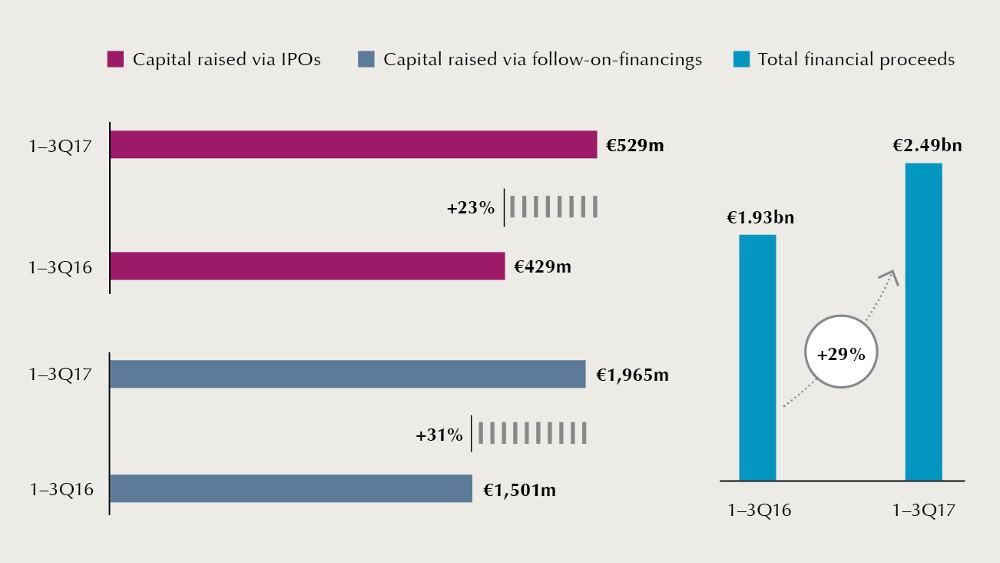
New wave of optimism for European biotech stocks
The European biotech stock market witnessed an increase in IPO and follow-on financing volumes in 2017. According to the new BIOCOM capital market report, published in November during BIO-Europe in Berlin, more than half the money was raised on the US Nasdaq. Within Europe, Euronext is still is the most attractive location - but Stockholm is catching up.
Taking all indicators into account – number and volumes of IPOs, follow-on financings, and secondary listings – the 228 European biotech companies raised €2.49bn by Q3/2017, 29% more than during the same period in 2016 (€1.93bn). More than half the money (54%, €1.34bn) was raised on the US Nasdaq. According to the report, published in November during BIO-Europe in Berlin, this highlights the power of biotech-focused investors available across the Atlantic.
In terms of numbers, however, Europe is in the forefront. A majority of 11 firms opted for one of the 14 European trading centres, with three firms floating on the US Nasdaq instead. All IPOs together yielded a total amount of €529m (+23%). Among the European trading centres, Paris (45) and London (43) are the top locations with the highest number of listed biotech companies. As stated in the report, cross-border stock market Euronext is still among the most attractive stock exchanges for European biotech companies. Three of this year’s listings took place here. The analysis also reveals that in 2017, a new wave of listings took place in Scandinavia, among them one in Oslo and five in Stockholm. The Swedish capital has now caught up to Paris and London with a total of 40 listed biotech companies.
Nordic IPO experience
In 2016, Swedish Cyxone AB took the IPO route in Stockholm. For Kjell Stenberg and his management team, the company is the first result of a virtual company building strategy. Our focus is promising patented assets at mid-size academic research institutes, he said. Cyxone was founded based on a promising oral medication approach for multiple sclerosis with cyclotides, developed by physiologist Christian Gruber at MedUni Vienna and Carsten Gründemann from Freiburg University Hospital. To accelerate clinical development, the company raised €9m with the IPO in Stockholm. For our virtual company model, it offers a perfect platform for further capital increases," Stenberg says.
The report supports this trend: the overall situation for follow-on-financings in 2017 has recovered significantly compared to 2016. A total of €1.96bn was dropped into European biotech companies (+33%). This, however, is particularly true for the US Nasdaq, which saw an 176% increase compared to 2016 (€1.1bn) in follow-on-financings, including three secondary listings (Verona Pharma, argenx, Zealand Pharmaceuticals) which alone amounted to €251.5m.
During a panel discussion at BIO-Europe, Ulrica Slane Bjerke of Artic Fund Management said that sometimes VC companies dress up the bride maybe too early. Furthermore, she added, company leaders in Europe should have a long-term strategy: Plan for a life as a public stock. There is no lack of money in Europe, as the rise of new funds demonstrates. In November, Dutch BioGeneration Ventures (BGV) closed its third fund, BGV III, at €82m, exceeding the original target by €32m. New investors include Bristol-Myers Squibb, Johnson & Johnson Innovation, private equity investor Schroder Adveq, and MAN Pension Trust. According to partner Oskar Slotboom, the early stage fund will invest in 15 companies in Central Europe, focusing on innovative therapeutics (80%) and diagnostics (20%).
(First published in European Biotechnology, Winter Edition 2017)


 BioDlink
BioDlink
 Unsplash+
Unsplash+